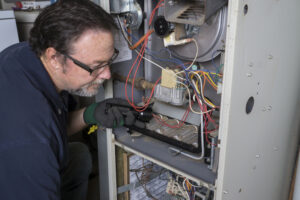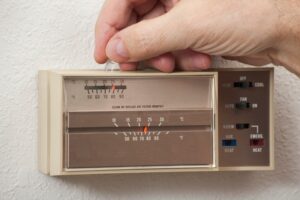Does Your Home Have Poor Indoor Air Quality?
Most people are aware of outdoor air pollution and the negative effects it has on both people and the environment. However, many homeowners do not consider how the poor indoor air quality of their home can be harmful to their families. Understanding the cause and effects of poor indoor air quality can help homeowners make changes to improve both comfort and health.
What Causes Poor Indoor Air Quality?
Poor indoor air quality can be caused by a number of sources including:
- Fumes from your gas-powered appliances such as the stove, water heater and dryer
- Allergens from inside the home such as pet dander, dust mites, and mildew
- Irritants from cleaning products
Chicagoland homeowners have their homes closed for many months of the year in order to maintain comfort. The harsh temperatures of the summer and winter necessitate the use of heating and cooling and keeping the windows closed. Unless the irritants are removed from the air, they continue to circulate through the home and can result in health problems.
What Are the Effects of Poor Indoor Air Quality?
Poor indoor air quality can threaten or worsen the health of your loved ones. This is particularly true for young children, the elderly, and people with underlying health concerns such as allergies or asthma. Some physical signs of the effects of poor indoor air quality include:
- Difficulty breathing at night
- Shortness of breath or wheezing
- Worsening of preexisting breathing problems
- Waking up with eyes that itch or are watery
- Symptoms of seasonal allergies that do not lessen
Some of the Consequences
Poor indoor air quality can have a number of consequences, that include:
Susceptibility to Illness
Individuals who live in homes with poor indoor air quality are more susceptible to illness. Frequent headaches, trouble sleeping and recurring colds may be caused by germs and other microorganisms that are recirculated through the home’s HVAC system. This is especially true for Chicagoland homeowners who run their air conditioning constantly during the summer months to keep cool.
HVAC Wear and Tear
When your indoor air is dirty, you can bet that some of that dust and debris is getting into HVAC components and ducts. Your air conditioner and furnace must work harder to maintain the temperature you’ve set for your home. This additional load results in wear and tear on the system, resulting in a reduced lifespan. Poor indoor air quality can result in needing to replace or repair your HVAC equipment more often.
Increased Expenses
When heating and cooling systems works harder, they must use more energy, resulting in higher utility bills. Poor indoor air quality can erode the overall energy efficiency of your home.
How Can Indoor Air Quality Be Improved?
Improving indoor air quality is a multi-step process:
- Increase Ventilation – It’s a good idea to open the windows and allow fresh outdoor air inside when the weather permits. However, outdoor air contains irritants, as well. For optimum results, consider a whole-home ventilator installed by your HVAC professional.
- Air Conditioning – Many common irritants are water soluble. This means that a number of the irritants are removed from the air when the air conditioner reduces the amount of moisture in the air.
- Change Your Filters – Change the filters in your HVAC system regularly. A clean filter can significantly reduce the amount of allergens and irritants in the air and help to ensure your HVAC system runs efficiently. HEPA (high-efficiency particulate air) filters provide the best protection for your family, though they likely will require system modifications if attached to our forced-air system.
- Cleaning Products – Carefully choose the cleaning products you use in your home. Nontoxic cleaning products that do not contain VOCs (volatile organic compounds) are the best for the home’s indoor air quality. VOCs can be found in many common household cleaners and are harmful when inhaled.
- Eliminate Cigarette Smoke – Secondhand smoke from cigarettes can dramatically erode indoor air quality. Smoke outside and ask guests to smoke outside to reduce the negative effects on the home and the health of your loved ones.
- Consult a Professional – Consult a HVAC expert for assistance if your home’s indoor air quality is a concern. A professional can help you identify areas of concern and implement corrections.
Find out more about addressing poor indoor quality by contacting the experts at Climate Master Mechanical. Our expert team has served the needs of Chicagoland for 23 years.
Image Provided by Shutterstock.com
You May Also Like

3 Ways Ductwork Impacts HVAC System Performance in Mokena, IL
Ductwork is critical to making any central HVAC system work efficiently. Here are three ways your ductwork influences the performance of the… Continue Reading 3 Ways Ductwork Impacts HVAC System Performance in Mokena, IL…

3 Furnace Odors and What They Mean in New Lenox, IL
When you first turn on a brand-new furnace, you might expect a few mild odors to appear as the system establishes itself.… Continue Reading 3 Furnace Odors and What They Mean in New Lenox, IL…

Do I Need to Replace My Old HVAC Thermostat in Mokena, IL?
A thermostat is like the brain of your HVAC system. If it doesn’t function properly, no part of the HVAC system in… Continue Reading Do I Need to Replace My Old HVAC Thermostat in Mokena, IL?…

